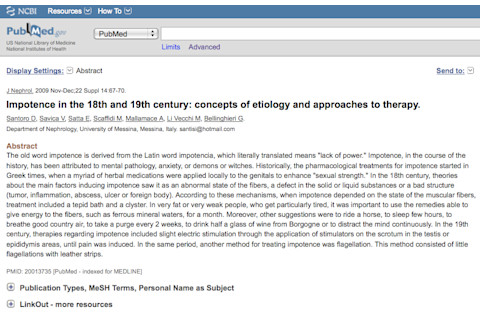
Impotence in the 18th and 19th century: concepts of etiology and approaches to therapy. "The old word impotence is derived from the Latin word impotencia, which literally translated means "lack of power." Impotence, in the course of the history, has been attributed to mental pathology, anxiety, or demons or witches. Historically, the pharmacological treatments for impotence started in Greek times, when a myriad of herbal medications were applied locally to the genitals to enhance "sexual strength." In the 18th century, theories about the main factors inducing impotence saw it as an abnormal state of the fibers, a defect in the solid or liquid substances or a bad structure (tumor, inflammation, abscess, ulcer or foreign body). According to these mechanisms, when impotence depended on the state of the muscular fibers, treatment included a tepid bath and a clyster. In very fat or very weak people, who get particularly tired, it was important to use the remedies able to give energy to the fibers, such as ferrous mineral waters, for a month. Moreover, other suggestions were to ride a horse, to sleep few hours, to breathe good country air, to take a purge every 2 weeks, to drink half a glass of wine from Borgogne or to distract the mind continuously. In the 19th century, therapies regarding impotence included slight electric stimulation through the application of stimulators on the scrotum in the testis or epididymis areas, until pain was induced. In the same period, another method for treating impotence was flagellation. This method consisted of little flagellations with leather strips."

Photo: flickr/mikecogh
Related content: Discoblog: NCBI ROFL: Penis too long. What to do? Discoblog: NCBI ROFL: “the origin of penile intervention for decorative purposes is lost in time.” Discoblog: NCBI ROFL: What did God do with Adam’s penis bone? WTF is NCBI ROFL? Read our FAQ!













